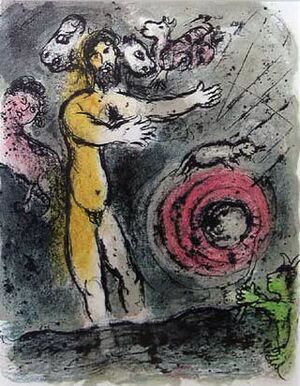The Odyssey: Difference between revisions
| Line 42: | Line 42: | ||
== The ''Odyssey'' in History == | == The ''Odyssey'' in History == | ||
== | == Afterlife == | ||
== Internal Links == | == Internal Links == | ||
Revision as of 21:34, 18 June 2006
Homer’s Odyssey is a nostos, or an epic of return, and asks if one can come home again, especially after years of bloody war. In fact, an odyssey is now meant generally as a long journey home, much like Odysseus’ after the fall of Troy. The Odyssey attempts to remake order after the chaos of war. Odysseus, a young man when Agamemnon and Menelaos recruited him for the campaign against Ilium, is now a middle-aged survivor and veteran of that war who must be smarter than the champion Achilles and the leader Agamemnon in order to return home and set his lands in order. War almost seems easy in the light of Odysseus’ journey — at least in war, he knew his enemies. Enemies during peacetime wear many masks; Odyssey must do the same if he is to survive. Odyssey has emenies that can't be be humanly fought; the gods, but Athena helps him to get home safely.
Summary
The Odyssey’s action is spread over twenty-four books, generally half before Odyssey returns home, and half after. Throughout his journey odyesseus grows to be a better person.For a synopsis of each book, see The Odyssey Summary.
Comparisons
Gods and Mortals
List of Characters
Human Beings
List of Suitors
The Women of the Odyssey
The Supernatural Beings of the Odyssey
The Odyssey in History
Afterlife
Internal Links
Commentaries
- Odysseus — A background on the Odyssey and Odysseus
- A Study Guide by David Claudon
- Myth and the Odyssey
- The Odyssey: General Notes
- The Telemachiad (books 1-4 of the Odyssey)
- Odysseus and the Poet: Notes on Book VIII
- The Odyssey: Notes on Book IX
- The Odyssey: Notes on Book X
- Poor Confusing Elpenor
- The Odyssey: Notes on Book XI
- The Odyssey: The Lessons of Hell (more on Books XI and XII)
- The Odyssey: Odysseus’ Return
- [http://www.sparknotes.com Quiz to review
Suggested Reading
Works Cited
- Grimal, Pierre. Larousse World Mythology. New Jersey: Chartwheel Books Inc. 1973.

